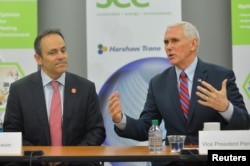U.S. Vice President Mike Pence appealed Saturday to voters in Kentucky to support "a battle" in Congress to replace the nation's health care law with a bill being pushed by Republican Party leaders.
Demonstrators both for and against the Republicans' drive to repeal and replace the Affordable Care Act, signed into law by former President Barack Obama, turned out for Pence's appearances in Louisville, Kentucky's largest city.
President Donald Trump, Pence and Republican Party leaders are facing opposition from both sides of the political spectrum as they try to promote their replacement for the health insurance law known popularly as Obamacare, which has been in operation since 2010.
'Battle' looms on Capitol Hill
Pence spoke to a friendly audience in Louisville: "Folks, let me be clear: This is going to be a battle in Washington, D.C., and for us to seize this opportunity to repeal and replace Obamacare once and for all, we need every Republican in Congress, and we're counting on Kentucky."
On the way to the energy services company where the vice president spoke, his motorcade passed hundreds of anti-Trump protesters lining the streets. Some wore "Not My President" T-shirts, while others waved signs urging U.S. lawmakers to leave affordable care alone, including "Don't Kill People, Keep Affordable Care."
One of Kentucky's two Republican senators, Rand Paul, is one of the new health care bill's fiercest critics and a leader among those in Congress who say they will vote against the party leadership's recommendations. Paul has denounced the initial version of the replacement bill as "Obamacare Lite."
Trump sees 'great progress'
Paul, other conservative lawmakers and groups who share their objections to the replacement bill are calling on the Trump administration to immediately cut off cash that the federal government gives to states under the Affordable Care Act to support the Medicaid program, which provides care for the neediest Americans.
The party leaders' bill, the American Health Care Act, would keep funding states' Medicaid programs until 2020.
Despite the cacophony of protests and clashing political rhetoric, Trump professes to be unconcerned. He posted a note on Twitter Saturday seeking to assure Americans that the Republican Party's replacement bill was moving forward.
Pence said he'd come to Kentucky because the state was "a textbook example of Obamacare's failures." The vice president said health insurance premiums in the state "skyrocketed" last year by an average of 24 percent, and that families in nearly half the state could not choose which insurer they wanted, since there was only one insurance firm participating in the federal program.
Humana Group, one of the largest health insurers in the United States, is headquartered in Louisville, but according to Pence, the firm intends to withdraw next year from Kentucky's Affordable Care Act program.
Problems worse in Kentucky
Governor Matt Bevin is opposed to the Republican Party's replacement bill, but he also complains that Kentucky already cannot afford to pay for its growing Medicaid program, which covers more than one-quarter of the state's population.
"Medicaid is threatening to bankrupt" Kentucky and other states, Pence said. But in contrast to conservative critics of the American Health Care Act, the vice president said the new funding approach to Medicaid under the replacement bill would give all states the "freedom and flexibility" to meet their needs.
Louisville protest organizer Chris Rowzee, part of an anti-Trump movement known as "Indivisible Kentucky," voiced strong disagreement with the replacement legislation and its supporters.
"The health care bill they're trying to ram through is horrible for this country, and especially horrible for Kentucky," she told Louisville's Courier-Journal newspaper. "Here in Kentucky, the Medicaid expansion opened health care to hundreds of thousands of people," whose benefits would be threatened if the new bill went into effect.
The proposed new legislation would not provide as much mental health and substance abuse coverage as Obamacare, Rowzee said, and that would hit Kentucky especially hard, since the state is ravaged by an epidemic of opioid abuse.






